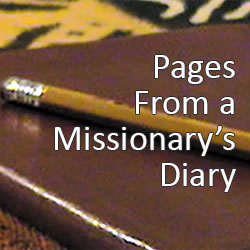
I attended a Marian procession in Newtown, a suburb of Suva City, Fiji. About 50 people, mainly women and children walked behind the statue of our Lady of Fatima as it was carried from one family home to another. Many candles lit up the cool, dark night. The devotees sang hymns and one of the ladies led the rosary.
 It was a folk religious event. No priest led the prayers. There were no symbols of Christ and no reading from the Bible. The hymns were to Mary and about Mary. It was devotional but, with the children jostling the statue, it was not formal. The group was multi-racial and multi-religious. A Hindu lady near me was searching for a candle. A Tongan lady, deserted by her husband, told me that she came to pray for her delinquent son. In the host house, Mary’s statue was enthroned on a table set with white cloth and flowers. Everyone squatting inside and outside the house gazed at the statue absorbed by their own private intentions. Afterwards, tea was served to all.
It was a folk religious event. No priest led the prayers. There were no symbols of Christ and no reading from the Bible. The hymns were to Mary and about Mary. It was devotional but, with the children jostling the statue, it was not formal. The group was multi-racial and multi-religious. A Hindu lady near me was searching for a candle. A Tongan lady, deserted by her husband, told me that she came to pray for her delinquent son. In the host house, Mary’s statue was enthroned on a table set with white cloth and flowers. Everyone squatting inside and outside the house gazed at the statue absorbed by their own private intentions. Afterwards, tea was served to all.
There was something very attractive about the evening. Wounded people found a mediator through whom to touch the supernatural power of God. The community setting, the participative rituals, the prominence of the feminine, the longing for the healing of relationships and faith in the Virgin’s care for us stood out. Some of these needs do not seem to be met in our official religion. It would certainly be good to add an appropriate Bible reading and to place Christ with His mother. But the devotion and the feeling must be recognized and affirmed.
Columban Fr. Frank Hoare lives and works in Fiji.